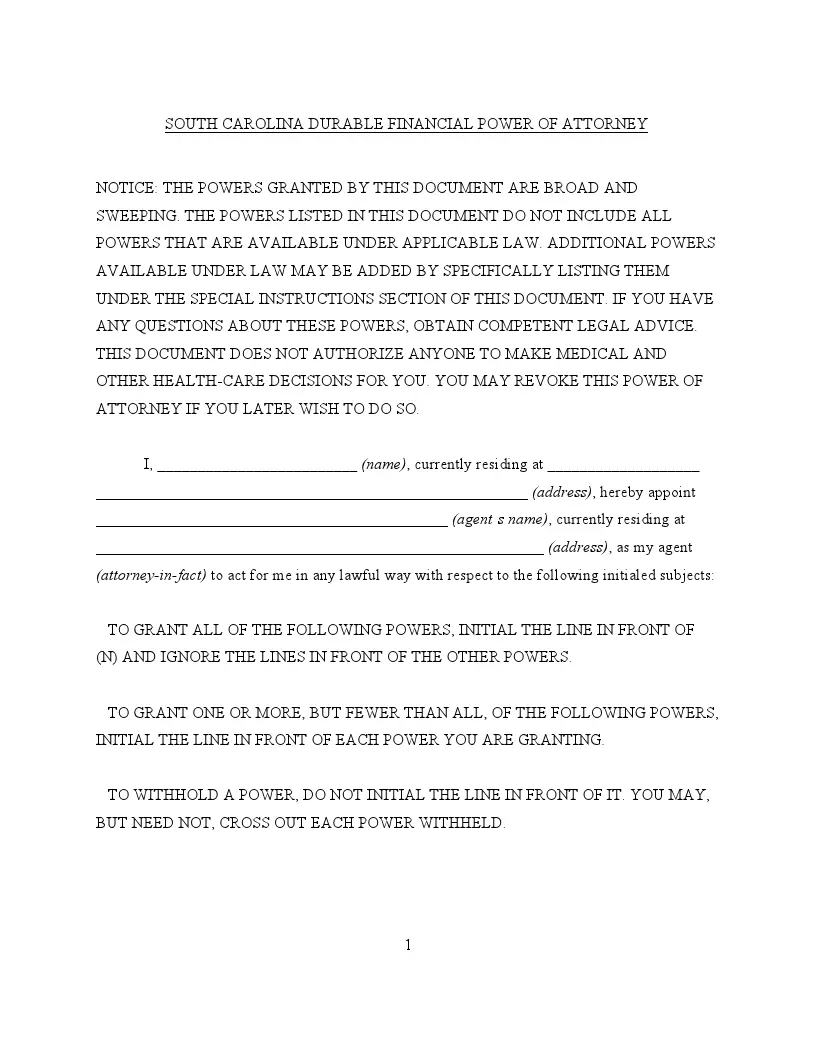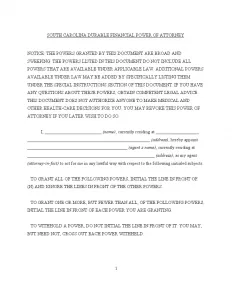Free South Carolina Durable Power of Attorney Form
A “Durable Power of Attorney” (or DPA) form is one of the legal forms in the US that regulates the relations between a person and his or her agent in critical situations. For instance, if a person (or a principal) is in a coma due to a disease or accident, or had a stroke, or diagnosed with dementia, the durable power of attorney form lets an agent act on behalf of the principal.
The word “durable” is used in the form’s official name because the DPA form will remain the same for a long period; it becomes ineffective if the principal is dead or has decided to call it off. To create a new form, a person has to revoke the previous DPA form first.
One should know that people in the US create and sign the DPA form to give the right of managing their finances and properties to someone. If you need to prepare such a form related to medical care and physical conditions, you should sign another form where you assign your medical care representative.
South Carolina power of attorney forms – learn more about powers of attorney related to other things in South Carolina.

Build Your Document
Answer a few simple questions to make your document in minutes
Save and Print
Save progress and finish on any device, download and print anytime
Sign and Use
Your valid, lawyer-approved document is ready
With the DPA form, one may legally state his will about important things and assign a reliable person to act in various cases. There are two ways of choosing a person who will become your attorney: you may pick someone among your relatives or close people (without any limits: a spouse, a family member, or someone else) or hire a specialist (an agent).
When a group of people is signing the DPA form, every member has to be in a sound mind, which is usually prescribed by law. Most likely, you will have to notarize the form: the majority of states ask for it. Some states require signing from a witness (or witnesses) as well.
South Carolina Signing Requires and Laws
The general information about the DPA form, rules, and basic terms are described in article 8, title 62 of South Carolina Code of Laws. In South Carolina, you will need to both notarize the DPA form and ask two witnesses to sign it.
The form is brief and should not take long; it consists of five pages only. When you (as a principal) will complete it, you may see several responsibilities that you can delegate to your agent or attorney. The list of financial matters in the DPA form includes:
- Real estate transactions
- Governmental perks and benefits operations
- Insurance operations
- Tax matters
And plenty of other actions that might be delegated to your agent are related to money and property.
Do not hurry to choose the delegated matters as soon as possible. Keep in mind that this is a serious deal, and you will trust your finances to someone else on occasion. So, take your time to read about all the responsibilities and decide which of them you would like to choose.
Usually, you should prepare and sign not less than three copies of the DPA form. Remember that rules in South Carolina require notarizing the form and signing it by two witnesses.
South Carolina Durable Power of Attorney Form Details
| Document Name | South Carolina Durable Power of Attorney Form |
| Other Names | South Carolina Financial Durable Power of Attorney, SC DPOA |
| Relevant Laws | South Carolina Code of Laws, Sections 62-8-101 to 62-8-403 |
| Signing Requirements | Notary Public and Two Witnesses |
| Avg. Time to Fill Out | 10 minutes |
| # of Fillable Fields | 37 |
| Available Formats | Adobe PDF |
Popular Local Durable POA Forms
POA docs are among the most widely downloaded ones within the United States. Take a look at some of the more demanded durable POA papers.
Steps to Complete the Form
For your convenience, we have placed instructions that help to complete the DPA form in South Carolina step by step. You may find them below.
1. Download the South Carolina DPA Form Template
Your first step in completing the DPA form would be downloading a template. Use our form building software to speed the process up and open the form on your device quickly.
2. Add Your Data and Your Agent’s Data
In South Carolina, the DPA form starts with inserting a principal’s name and address and an agent’s name and address. Firstly, place your name, address, and state, then add the agent’s or attorney’s details in the relevant lines.

3. Choose the Effective Date
Here, you should choose the effective date of your DPA form. In South Carolina, you may opt for the form effectiveness from the moment of signing or from the day when your physician determines your incapability.

4. Opt for Agent’s Responsibilities
In this section, you have to choose what to delegate to your agent or attorney. In South Carolina, the list of financial matters in the DPA form consists of:
- Real estate operations
- Tax matters
- Retirement plan
- Insurance transactions
- Banking operations
- Benefits from the government
- Gifts
- Personal property
- Lending and borrowing
- Powers to manage the property
- Legal advice and proceedings
- Safe-deposit box
Every item of the list has a brief description to ensure that the principal understands what he or she is signing and delegating. To choose the financial matter, place your initials in the blank field on the left-hand side. If you want, you may opt for all of the items.

5. Leave Special Instructions for the Previous Section
In the lines of this section, you may add some special instructions regarding the chosen financial matters. Those instructions may limit or increase your attorney’s powers. If you have nothing to write in this field, insert the word “None.”

6. Read the Following Text
The text below the “Special Instructions” section includes some rules that are applicable to this DPA form in South Carolina. As a principal, you have to read them thoroughly and accept them. If something is still not clear, you may consult your lawyer.
7. Add a Date and Sign the DPA form
After reading and understanding the notice, you should sign the DPA form and add a relevant date.

8. Ask Two Witnesses to Sign
Under the principal’s signature, two witnesses should leave their signatures and addresses. Remember that your witness cannot be your agent.
9. Ask a Notary to Sign
After both witnesses have signed the DPA form, a notary should verify the document by signing, adding a signing date, and putting a seal (if applicable).

10. Give the DPA form to Your Agent or Attorney
The last page of the DPA form in South Carolina is for the agent’s acceptance of the appointment. Your agent (or attorney) should accept all the financial matters you are delegating, insert his or her name, and sign the DPA form. This signature is also serving as a specimen.
11. Ask a Notary to Sign Again
When your agent has accepted and signed the DPA form, a notary should verify his or her signature and sign the document one more time.

Different popular South Carolina templates readily available for download on FormsPal and that can be modified in our hassle-free document builder.
Download a Free South Carolina Durable Power of Attorney Form
